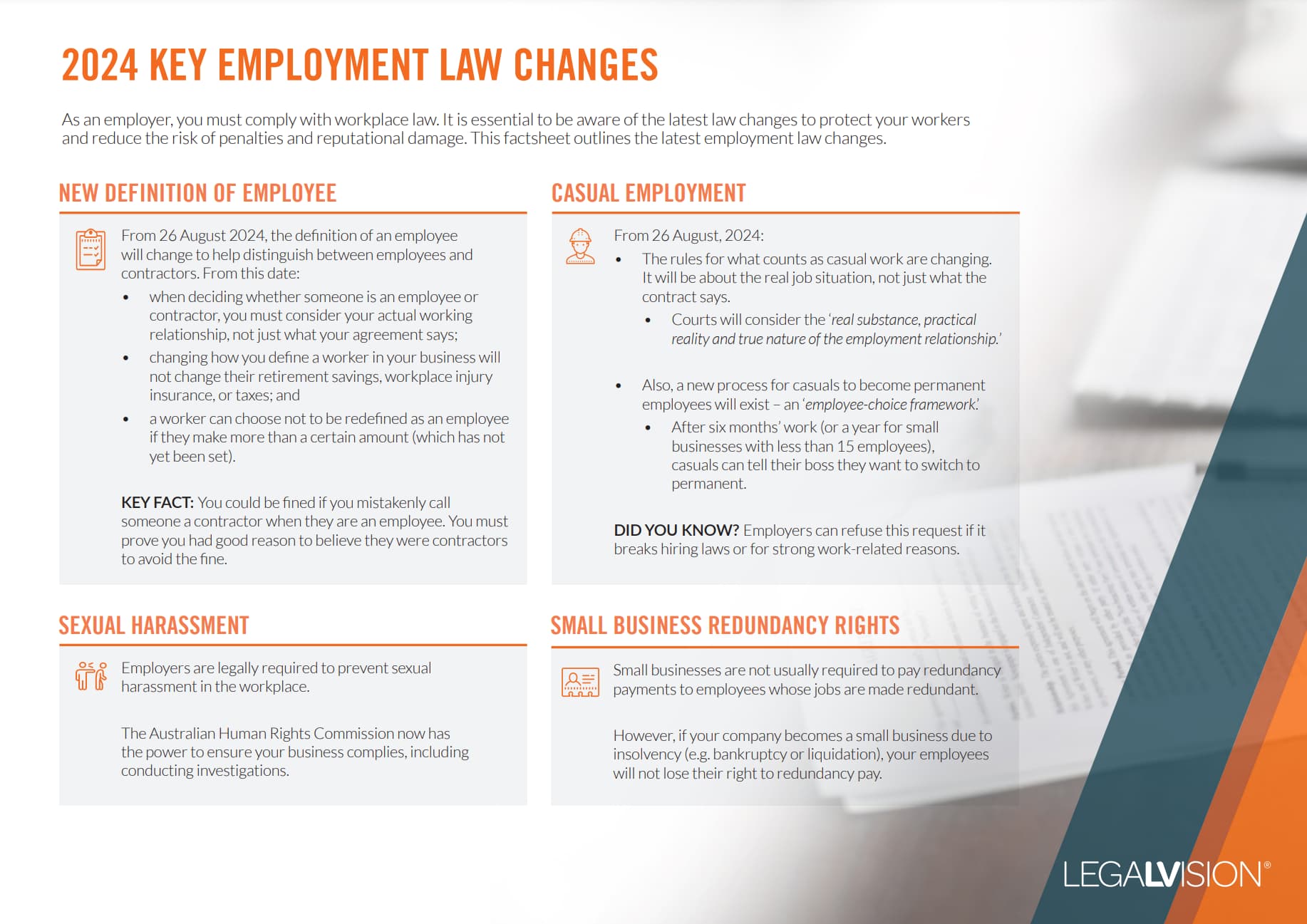In Short
- Employment contracts are essential to protect both employer and employee interests in Salesforce support businesses.
- Key contract elements include job responsibilities, remuneration, working hours, confidentiality, IP ownership and restraint of trade.
- Salesforce-specific clauses should address data access, security and appropriate use of Salesforce tools.
Tips for Businesses
When creating employment contracts for Salesforce support roles, include standard protections like confidentiality and IP clauses. Customise the contract with Salesforce-specific terms on data security and tool usage to safeguard business interests. Define job expectations and working hours clearly to manage roles effectively. Tailoring contracts ensures alignment with business needs and legal compliance.
Employment contracts can be challenging to navigate; however, having a well-drafted contract for Salesforce support businesses can assist your business’s overall process and management. Employment contracts can help protect both your interests as an employer and the interests of your employees. This article will discuss:
- the critical elements of an employment contract;
- Salesforce-specific considerations; and
- the legal benefits and best practices to implement so your business runs successfully.
What Do I Need to Include in an Employment Contract?
A well-drafted employment contract will include key terms that protect you as the employer and outline your employees’ ongoing obligations.
Job Title and Responsibilities
While it may seem straightforward, an employment contract should always include the employee’s job title and responsibilities. This will set out your expectations as an employer and allow your employees to understand the role and duties associated with their position.
Remuneration and Benefits
Remuneration and benefits may cover a range of details, such as your employee’s:
- base salary;
- superannuation; and
- potential bonuses or commissions.
If you intend to offer your employees bonus or commission payments, or equity in the business, consider setting out these entitlements and parameters around eligibility in a separate agreement or scheme. This:
- ensures you retain discretion over these additional benefits; and
- reduces the risk of your business breaching the employment contract if things change.
Working Hours
Within the employment contract, you should include specific details of work hours for your employee and expressly reference that there may be a requirement for them to work reasonable additional hours if the employee earns a salary. Setting out your business hours in the contract is also helpful.
Confidentiality
Employees are often dealing with sensitive and confidential business information. It is essential to protect your confidential information by ensuring such obligations are in the employment contract. One way to achieve this is by including a confidentiality or non-disclosure clause. As the employer, you can set out what is considered confidential information and pursue legal action if an employee breaches their obligations under a confidentiality clause.
Intellectual Property
Intellectual property or ‘IP’ forms an intrinsic part of the employment contract. An IP clause is critical if you or your employees are creating, developing or designing products, materials or ideas unique to the business. A well-drafted contract will include provisions assigning you, as the employer, ownership in the IP rights of an employee who develops a product while employed.
Restraint of Trade Clause
A restraint of trade clause may restrict employees from taking up employment with or starting a competitive business trading with competitors. Restraint provisions may also prevent an employee from soliciting clients or workers once they have left your business. However, it is essential to note that if a restraint of trade clause is considered unreasonable, it may be deemed void.

As an employer, it is essential to understand what employment laws have changed and their implications for your business — particularly the changes to the Fair Work Act 2009 through the new Closing the Loopholes legislation.
Are There Additional Considerations Specific to Salesforce?
You will need to consider a range of additional clauses specific to Salesforce, as outlined below.
Data Access and Security
The employment contract should outline your policies when accessing and handling customer information within the Salesforce platform. This clause should be an extension of what is already in place for internal systems within your business. You may consider including:
- when and how employees access customer data;
- who may access it; and
- restrictions on handling customer data that is irrelevant or not aligned to an employee’s scope of work.
Use of Salesforce Tools and Applications
As an employer, you may want to include terms of use when an employee interacts with the Salesforce platform. Policies relating to use may consist of Salesforce-specific products such as AI, data cloud, or sales. Such clauses can set out what and how your employee may use these products and assist them with further guidance on their scope of work.
Continue reading this article below the formWhat are the Legal Benefits of Having an Employment Contract?
As an employer in a Salesforce support business, you must be aware of various facets of your business and ensure that best practices are in place to protect your interests. While having an employment contract is not a requirement at law, setting out each party’s obligations to the contract will ensure your expectations as an employer are clear and that your valuable assets and interests are protected during and after the employment relationship.
Key Takeaways
When implemented correctly, employment contracts for Salesforce support businesses can assist in operating and managing your business. The key things you should include are:
- Ordinary Clauses: remuneration, hours of work, confidential information, intellectual property and restraint clauses; and
- Salesforce-specific Clauses: relating to the appropriate use and management of data and software.
If you need help drafting employment contracts, our experienced employment lawyers can assist as part of our LegalVision membership. For a low monthly fee, you will have unlimited access to lawyers to answer your questions and draft and review your documents. Call us today on 1800 485 860 or visit our membership page.
Frequently Asked Questions
A Salesforce support business provides services for implementing and supporting a customer relationship management (CRM) platform.
Intellectual property, or ‘IP,’ is intangible property. It can be a creation, idea, or design. You can put protections in place to prevent others from distributing your designs without your consent.
We appreciate your feedback – your submission has been successfully received.












